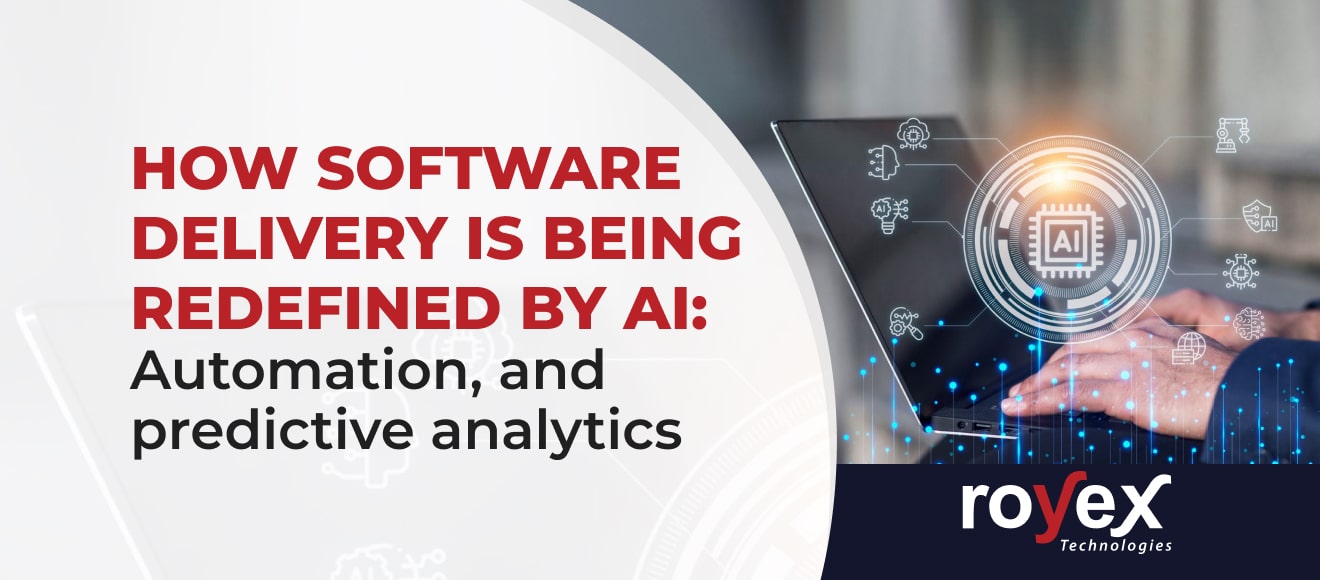
How Software Delivery Is Being Redefined by AI: Automation, and Predictive Analytics
The landscape of software delivery is undergoing a seismic shift, driven by the rapid advancements in Artificial Intelligence (AI). As businesses race to meet growing customer demands and market pressures, the integration of AI into software development processes has become a critical differentiator. Traditional methods of delivering software, often plagued by manual errors, slow release cycles, and scalability challenges, are being redefined by AI's ability to automate complex tasks, predict outcomes, and enhance decision-making. This shift is not merely a technological upgrade; it represents a fundamental change in how software is conceived, developed, and deployed. Companies that harness the power of AI in software delivery are gaining a competitive edge by delivering products faster, with fewer bugs, and with greater alignment to user needs.
With the integration of AI, automation, and predictive analytics, the software delivery process has evolved from a linear, labor-intensive approach to a dynamic, data-driven operation. AI-driven automation is streamlining every stage of the software development lifecycle (SDLC), from code generation and testing to deployment and monitoring. Predictive analytics, on the other hand, is providing valuable insights that allow teams to anticipate issues, optimize resources, and make informed decisions. These advancements result in enhanced efficiency, reduced errors, and improved customer satisfaction, making AI a cornerstone of modern software delivery. As organizations increasingly rely on AI to meet the demands of a fast-paced, precision-driven market, this transformation is no longer just a trend but a necessity for staying competitive and relevant in today's digital economy.
In this article, we'll explore how AI is revolutionizing software delivery, the role of automation in streamlining processes, and how predictive analytics is shaping the future of software development.
The Evolution of Software Delivery

Historically, software delivery was a manual, time-consuming process. Developers would write code, test it, and deploy it, often encountering numerous bugs and errors along the way. This cycle would repeat until a stable version was finally delivered. However, with the advent of AI, this process is being streamlined in ways that were once unimaginable.
AI-powered tools are now capable of automating vast portions of the software development lifecycle (SDLC). From code generation to testing, deployment, and monitoring, AI is transforming every stage of software delivery. But automation is just the beginning. Predictive analytics, fueled by AI, is pushing the boundaries further, enabling companies to anticipate issues, optimize resources, and deliver software with unprecedented speed and accuracy.
Automation in Software Delivery
Automation has been a key driver in the evolution of software delivery, but AI has taken it to the next level. By leveraging machine learning algorithms, AI-powered automation tools can perform tasks that were once the domain of skilled developers. For example, AI can now generate code snippets, identify bugs, and even suggest optimizations, reducing the need for human intervention.
One of the most significant benefits of AI-driven automation is the reduction in manual testing. Traditional testing methods are labor-intensive and prone to human error. AI, however, can automate testing processes, running thousands of tests in a fraction of the time it would take a human. Moreover, AI can learn from previous tests, adapting and improving its testing strategies over time. This not only accelerates the testing phase but also ensures that the software is of the highest quality before it is delivered.
Continuous Integration and Continuous Deployment (CI/CD) pipelines have also been revolutionized by AI. By automating the build, test, and deployment processes, AI ensures that software is always in a releasable state. This means that new features and updates can be delivered to customers faster and more reliably than ever before.
AI-Powered Development Assistance

AI is increasingly becoming an indispensable ally for software developers. Advanced code completion tools, powered by machine learning algorithms, can now predict and suggest entire code blocks, significantly speeding up the coding process. These AI assistants learn from vast repositories of code, offering contextually relevant suggestions that often surpass simple autocomplete functionalities.
Moreover, AI-driven code review tools are enhancing code quality by automatically detecting potential bugs, security vulnerabilities, and style inconsistencies. These tools can analyze code faster and more thoroughly than human reviewers, allowing developers to focus on more complex problem-solving tasks.
Predictive Analytics: Anticipating Challenges and Opportunities
While automation focuses on executing tasks, predictive analytics leverages AI to anticipate challenges before they arise. By analyzing vast amounts of data from previous projects, AI can identify patterns and predict potential bottlenecks, resource constraints, and even customer preferences.
By analyzing historical project data, these tools can forecast potential delays, resource bottlenecks, and budget overruns with remarkable accuracy. Project managers can use these insights to make data-driven decisions, allocate resources more effectively, and mitigate risks before they escalate.
Furthermore, predictive models can estimate the effort required for new features or bug fixes, helping teams to plan sprints more accurately and manage stakeholder expectations more effectively.
For instance, AI can analyze historical data to predict the likelihood of a particular feature causing issues during deployment. This allows developers to address potential problems before they become critical, reducing downtime and ensuring a smoother delivery process. Predictive analytics can also optimize resource allocation by forecasting the demand for specific features or services, allowing companies to allocate their resources more effectively.
Moreover, predictive analytics plays a crucial role in enhancing customer satisfaction. By analyzing user behavior and feedback, AI can predict which features or updates are likely to resonate with customers. This enables companies to prioritize their development efforts, ensuring that they are delivering software that meets or exceeds customer expectations.
The Impact on Software Delivery Teams
The integration of AI, automation, and predictive analytics is not just transforming the technology behind software delivery; it is also reshaping the roles and responsibilities of software delivery teams. As AI takes over routine tasks, developers can focus on more strategic, creative aspects of software development.
However, this shift also requires teams to adapt to new tools and methodologies. Software engineers must now be proficient in AI-driven technologies, while project managers need to understand how to interpret and act on the insights provided by predictive analytics. The ability to collaborate effectively across these disciplines will be key to success in this new era of software delivery.
Intelligent Deployment and Release Management
AI and automation are streamlining the deployment process, making it more reliable and efficient. Intelligent systems can now determine the optimal time for releases based on factors such as system load, user activity patterns, and potential impact on business operations. These systems can also automatically roll back deployments if they detect anomalies or performance issues, minimizing downtime and user impact.
Canary releases and feature flags, managed by AI, allow for more controlled and targeted rollouts. Machine learning algorithms can analyze user behavior and feedback in real-time, automatically adjusting the rollout strategy to maximize adoption and minimize disruption.
Proactive Maintenance and Issue Resolution
AI-powered monitoring tools are transforming how software is maintained post-deployment. These systems can detect anomalies and predict potential issues before they impact users, enabling proactive rather than reactive maintenance. By analyzing patterns in log files, user behavior, and system metrics, AI can often pinpoint the root cause of issues faster than human operators.
Chatbots and virtual assistants, powered by natural language processing, are improving user support by handling routine queries and guiding users through troubleshooting steps. This not only improves the user experience but also frees up human support staff to focus on more complex issues.
Enhanced Security Measures
As software systems become more complex, ensuring security becomes increasingly challenging. AI and machine learning are playing a crucial role in identifying and mitigating security threats. These technologies can analyze vast amounts of data to detect unusual patterns that may indicate a security breach, often in real-time.
Automated security testing tools, integrated into the CI/CD pipeline, can continuously scan for vulnerabilities, ensuring that security is baked into the software from the earliest stages of development. AI can also assist in generating and maintaining secure configurations, reducing the risk of misconfigurations that often lead to security breaches.
The Future of Software Delivery

The future of software delivery lies in the seamless integration of AI, automation, and predictive analytics. As these technologies continue to evolve, we can expect even greater advancements in how software is developed, tested, and delivered. Companies that embrace these innovations will be better positioned to deliver high-quality software faster and more efficiently than their competitors.
In conclusion, AI is redefining software delivery by automating routine tasks and providing valuable insights through predictive analytics. This transformation is not only enhancing the speed and quality of software delivery but also empowering teams to focus on innovation and customer satisfaction. As we look to the future, it is clear that AI will continue to play a central role in shaping the way software is delivered, ensuring that companies can meet the ever-growing demands of the digital age.
AI offers a plethora of options suitable for various company sizes and financial capacities. Should you require internal expertise to navigate suitable tools for your business, consulting a leading artificial intelligence (AI) company in Dubai, like Royex Technologies, can prove invaluable.
Check our portfolio to see our previous works. Contact us via email at info@royex.net or call us at +971566027916. To get started with us.





